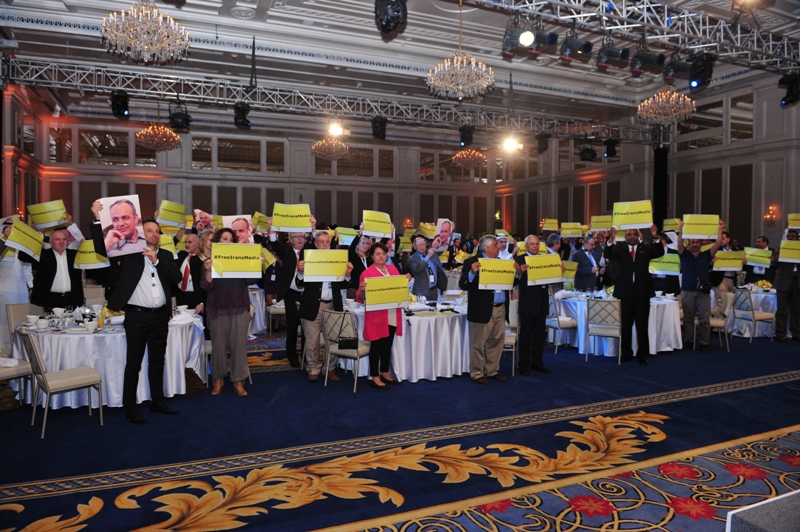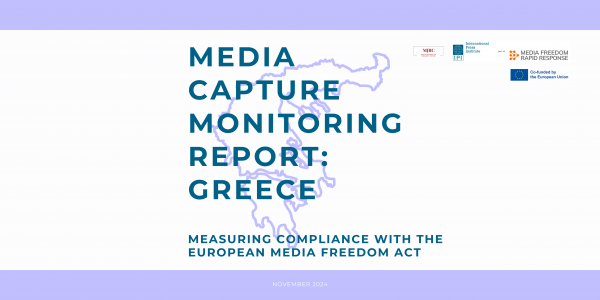Engaging in journalism in Iran can be like “walking on a minefield”, Iranian journalist, academic, writer and political analyst Ahmad Zeidabadi said in a statement delivered on his behalf at a ceremony at the 2016 International Press Institute (IPI) World Congress in Doha, where he was honoured in absentia as IPI’s 68th World Press Freedom Hero.
However, Zeidabadi – who was unable to join the ceremony due to a lifetime travel ban Iran imposed on him in 2009 – noted that, unlike a minefield, which “has its own logic and rules” and where “one can avoid stepping on a mine if one is clever enough to use a map and avoid the mines”, journalism in Iran “has no official regulation and discipline”.
In remarks read out by Morten Østervang of the Copenhagen-based International Media Support (IMS), he continued: “For this reason, professional journalists [in Iran] lack security and peace of mind to work consistently and responsibly, and especially to have an impact on the public.”
Zeidabadi’s statement was delivered to an audience of over 300 leading journalists and others who gathered on the first night of the IPI World Congress and 65th General Assembly in Doha to honour him and Turkey-based news platform Medyascope.tv, IPI’s 2016 Free Media Pioneer.
IPI gave Zeidabadi its World Press Freedom Hero Award, presented in partnership with IMS, for his courageous fight for freedom of expression, human rights and democracy in his country despite continued persecution by authorities. He has suffered multiple arrests, imprisonment in solitary confinement, internal exile, and a lifetime ban on social and political activities due to his journalistic work.
Reflecting on his current circumstances, Zeidabadi said: “It seems I am condemned to become a stranger in my own country and have my mouth shut. In such a condition, sometimes I think I have been condemned to ‘civil execution’ or to go through a ‘silent death’ and be forgotten altogether.”
But, he added: “when suddenly it is announced that an international organisation such as IPI selects ‘you’ as their ‘World Press Freedom Hero’, and when you remember that throughout the world, your journalist colleagues and other organisations… remember that ‘you’ existed and once used to write and offer analysis, this gives you hope that one day you will again be able to write, because our world is sailing faster than ever through its history.”
Read the full text of Zeidabadi’s remarks
IPI Executive Director Barbara Trionfi said the group was proud to honour Zeidabadi and she called on Iranian authorities to seize the momentum presented by recent political developments in Iran to provide greater respect for human rights, including free expression and press freedom.
“Mr. Zeidabadi provides a strong example of bravery and determination in support of press freedom despite great personal cost,” she said. “We urge Iran’s government to remove restrictions that prevent him and others in the country from freely sharing news and information, and in particular to free the dozens of journalists and bloggers currently in prison for having spoken out.”
Østervang similarly hailed Zeidabadi, noting that his “courage and professional dedication to the work for independent journalism and press freedom in Iran is an inspiration to us all”.
Free Media Pioneer
IPI and IMS also praised Medyascope, which they jointly presented with IPI’s Free Media Pioneer Award, for its innovative use of new technology to reach audiences in Turkey.
“At a time where independent media and press freedom is under tremendous pressure in countries across the world, the significant contribution of Medyascope.tv in providing uncensored information to the Turkish public deserves global acknowledgement and support,” Østervang said.
In remarks accepting the award, Medyascope founder Ruşen Çakır spoke of the environment in which the platform was launched in 2015 under the motto “Because it’s Free”.
“Fired, prosecuted and imprisoned journalists; government-seized newspapers and TV stations; social media bans, blocks and limitations; censorship and self-censorship,” he recounted.
Çakır noted that the outlet adopted its motto “not just to describe the distance we keep from the government”, but because: “We believe that a pressing concern for ratings, viewership and readership metrics is another serious deterrent for the freedom of press.”
Utilizing the video-streaming app Periscope, as well as podcasts on iTunes and SoundCloud, Medyascope provides an independent, alternative source of news to mainstream Turkish media, which has come under increasing and widespread government and economic pressure.
“We try to clarify our position with this maxim: a journalist, especially in a country like Turkey, must survive first, yes,” Çakır said. “But so must his journalism. This is precisely what we all aspire to do at Medyascope. And not even all of us are journalists, which to me is one of the greatest differentiating factors of Medyascope. It brings together professional journalists with concerned citizens that have a good grasp on new technologies.”
Commenting on Medyascope’s recognition as a Free Media Pioneer, Çakır commented: “Being honoured with this award from IPI – only eight months into our operations – tells us that we must be on the right path.”



